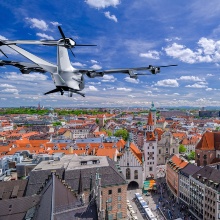To advance the development of regional and Urban Air Mobility, leading companies, universities, and research institutions as well as municipalities and organizations are joining forces to form the Air Mobility Initiative (AMI). The Institute of Flight Mechanics and Controls (iFR) [de] at the University of Stuttgart is also a partner in the initiative. This initiative, which is funded by the Free State of Bavaria and the Federal Republic of Germany, will set up a series of research projects aimed at making electric air mobility within and between cities a reality. The joint projects are centered around three main areas: electric aircraft, air traffic management services, and vertiports, meaning the necessary infrastructure on the ground.
More comfort in air taxis
"Future electric air vehicles must provide a high level of ride quality. Investigations and methods for the quantification and flight mechanical optimization of the ride quality are the major contributions of the University of Stuttgart in this initiative", says Walter Fichter, Professor of Flight Mechanics and Controls.
The scientist explains that air taxi design does not focus on the pilot but on the passengers. Air taxis are designed to fly in cities, so turbulence is to be expected. Flying at low frequency can quickly cause discomfort. This effect is called kinetosis (motion sickness) and is comparable to seasickness.
The University of Stuttgart is conducting research in the field of kinetosis. Researchers from the iFR are taking over a cable robot from the Max Planck Institute for Biological Cybernetics and are establishing this at the university, in collaboration with the Fraunhofer Gesellschaft. Using this cable robot, they can simulate aircraft movements using test subjects. The scientists can use the resulting measurements to create models depicting levels of discomfort experienced from aircraft movements. Artificial intelligence methods are also used here.
Urban air mobility of the future
"We will examine the various elements of such an air transport system in realistic projects to gain an accurate picture of the technical and regulatory requirements" said Andreas Thellmann, Head of Air Mobility Initiative. "Electric air transport can enhance public transport, airports and time critical mobility services, it will be environmentally friendly, quiet and safe."
The members of the Air Mobility Initiative include the University of Stuttgart, Airbus, City of Ingolstadt, Deutsche Bahn, Deutsche Flugsicherung, Diehl Aerospace, Droniq, Munich Airport, Red Cross and Telekom. In a first step, the AMI partners will address the technological, infrastructural, legal, and social prerequisites for the future implementation of advanced air transport. Subsequently, the knowledge gained will be carried through a demonstration project under real conditions with electrically powered vertical take-off aircraft.
Work on the individual AMI projects began in January 2022. The test flights of the pilot project will be carried out in the region around Ingolstadt. The initiative is funded with a total of €17 million from the Free State of Bavaria and €24 million from the Federal Government. Together with the industry's own funds, this results in a total activity of € 86 million over a period of three years.
Airbus is responsible for the electrically powered aircraft together with Diehl Aerospace, University of Stuttgart and other partners. Components and systems for the CityAirbus NextGen are to be developed in this workstream. A large number of other partners deal with the safe and efficient flight within and outside of cities (Unmanned Traffic Management), and with take-off and landing sites (Vertiport) and its connection to other means of transport.
| Contact | Prof. Walter Fichter, Institut für Flugmechanik und Flugregelung, University of Stuttgart |
|---|


